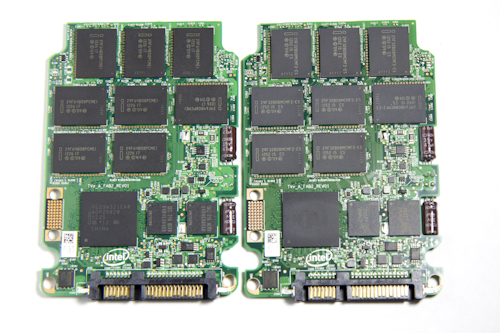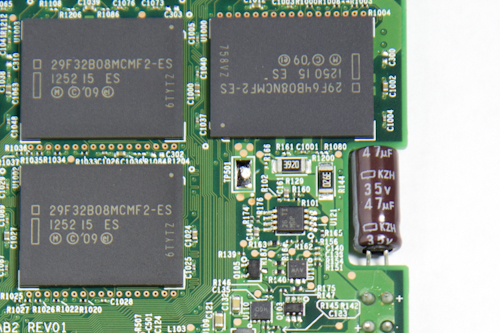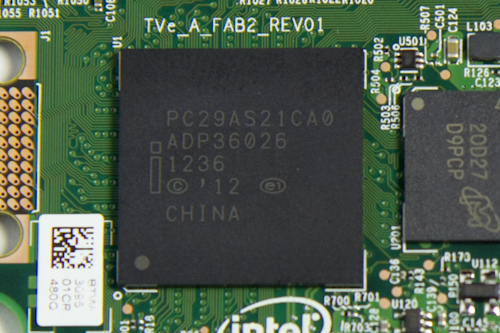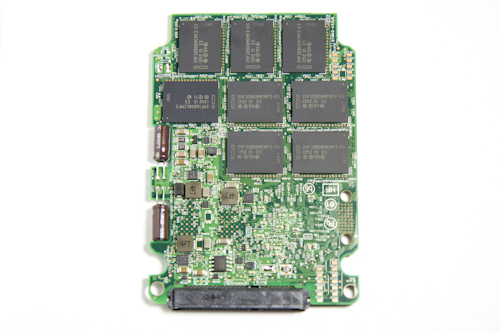The SSD DC S3500 Review: Intel's 6 Gb/s Controller And 20 nm NAND
As enterprise SSDs become more specialized and application-focused, Intel is hoping its SSD DC S3500 will strike a chord with customers looking for excellent read performance on a budget. We compare this drive to other notable contenders in its class.
Inside Intel's SSD DC S3500
If you've already read Intel SSD DC S3700 Review: Benchmarking Consistency, then you might want to skip ahead. The SSD DC S3500 and S3700 don't just share a few similarities; they share almost every single component. Starting on the exterior, they employ the same aluminum enclosure, right down to the part number. Can you tell which is which?
As with the S3700, we see two through-hole 35 V 47 uF capacitors notched into the edges of the PCB.
On the inside, we see three black, plastic stand-offs covering each of the screw holes. It's easy to observe that the PCB is identical to the one found on Intel's SSD DC S3700. Even the reference designators on the silk screen match. Both SSD DC S3000 families utilize the same PC29AS21CA0 controller, too. This Intel-developed, eight-channel, 6 Gb/s processors performed well in our S3700 review, exhibiting excellent consistency.
Next, we take note of two DDR3-1600 DRAM packages from Micron (MT41K512M8RA-125). Each FBGA module hosts 512 MB of memory, totaling 1 GB of cache on the SSD.
Up until now, the only difference between both drive families was the DRAM they use for cache. But with the SSD DC S3500, Intel is replacing the 25 nm HET-MLC found in the S3700 with 20 nm MLC. This is what gives Intel the ability to hit lower price points with its SSD DC S3500. And as we'll see shortly, it's also the reason why write endurance is so much lower.
As with the SSD DC S3700, some capacities of the S3500 have an odd assortment of NAND packages. The 480 GB version we have in the lab leverages fourteen 32 GB modules, one 64 GB module, and one 16 GB module. That adds up to 528 GB, yielding 9% over-provisioning. And that's substantially less than the SSD DC S3700 at ~22%.
Get Tom's Hardware's best news and in-depth reviews, straight to your inbox.
Current page: Inside Intel's SSD DC S3500
Prev Page Intel SSD DC S3500: Focusing On Read Performance Next Page Test Setup, Benchmarks, And Methodology-
Mastle Hi, Think there's an error on page 1, $579 for 80GB drive......Surely won't be getting it at that price for my home build!Reply -
busuan Found myself suddenly losing interests in SATA SSDs after seeing the specs of PCIe SSD in the latest MBA refresh.Reply -
PapaCrazy An Intel 320 series SSD I put in my dad's computer just encountered the 8mb bug even though the firmware was updated with the "fixed" version. He uses the computer for business and I got him an Intel SSD thinking it'd be reliable. I think I'm gonna try Samsung next time around.Reply -
Evolution2001 Nitpicking here... but the article text is still wrong...or the math is. :pReply
''...we do know that the 800 GB model we're reviewing should run around $579. At ~$1.20/GB, ...''
800GB @ $1.20 = $960. -
drewriley Reply10952175 said:Nitpicking here... but the article text is still wrong...or the math is. :p
''...we do know that the 800 GB model we're reviewing should run around $579. At ~$1.20/GB, ...''
800GB @ $1.20 = $960.
Thanks, just can't seem to get the right combination of 4, 8 and 0. The 480GB version is $579 -
drewriley Reply10952165 said:An Intel 320 series SSD I put in my dad's computer just encountered the 8mb bug even though the firmware was updated with the "fixed" version. He uses the computer for business and I got him an Intel SSD thinking it'd be reliable. I think I'm gonna try Samsung next time around.
With the BAD_CTX_13X (8MB) failure, the fixed firmware fixed 'most' of them. The failure rates are quite low, especially after the FW 'fix', but if that one failure happens on the only drive you bought, it can really suck. As a consumer, I could care less if a million other people got a good SSD, if mine fails, I am upset. As an enterprise buyer, if one fails out a million, my company is throwing a party!
-
flong777 Why does Intel continue to release mediocre SSDs? Granted this performs middle of the pack but I just don't understand why a company with Intel's resources doesn't put out a top performer like the 840 Pro.Reply -
Grizely1 Reply10955531 said:Why does Intel continue to release mediocre SSDs? Granted this performs middle of the pack but I just don't understand why a company with Intel's resources doesn't put out a top performer like the 840 Pro.
Go back and read the article.
Or, learn the difference between consumer vs commercial. It's a DT (Data Center). -
flong777 Reply10959572 said:10955531 said:Why does Intel continue to release mediocre SSDs? Granted this performs middle of the pack but I just don't understand why a company with Intel's resources doesn't put out a top performer like the 840 Pro.
Go back and read the article.
Or, learn the difference between consumer vs commercial. It's a DT (Data Center).
Fair enough, I guess I should have been more clear. I don't understand why Intel is involved with so many mediocre SSDs - whether enterprise or consumer.
While I am not an enterprise user, I think I understand the basics. Enterprise SSDs are geared to handle heavy cues and write loads.
You have a point that it is not fair to compare enterprise with consumer - they are two different animals.



